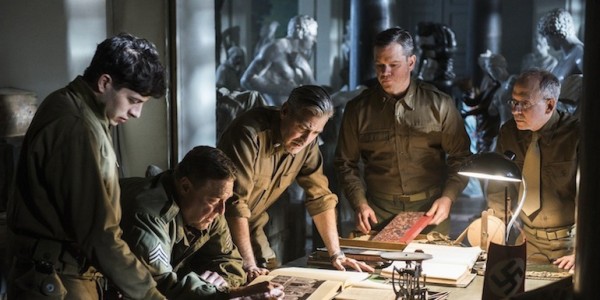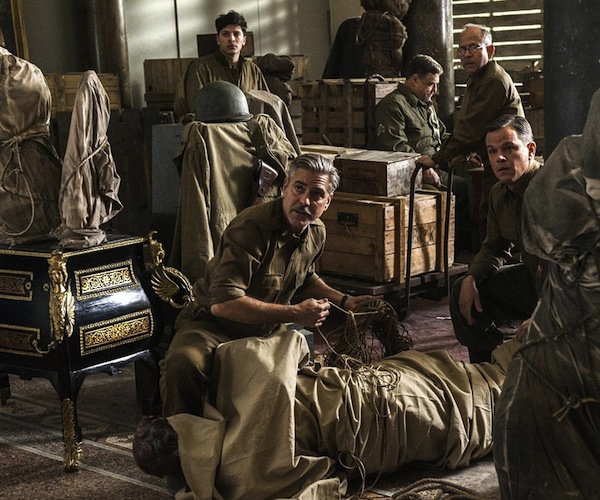Film Review: “The Monuments Men” — Saving Great Art from the Nazis
If George Clooney can rev up our righteous indignation decrying the barbarities of Joe McCarthy, why on earth couldn’t he become eloquent when it comes to talking about fighting to keep Hitler’s mitts off Michelangelo?
By Matt Hanson
At first blush, The Monuments Men (at cinemas around New England) sounds like the kind of movie that’s almost guaranteed to work. You’ve got a pretty solid premise, based on a true story, of how Lieutenant Frank Stokes, played by George Clooney who also co-wrote and directed, convinced FDR towards the end of World War Two to commission a bunch of art scholars and architects to track down and rescue priceless artworks from the thieving hands of the Nazis. The catch is that none of these guys are actual soldiers or trained in combat in any particular way. But through a little bit of pluck, ingenuity and a lot of reverence for the Old Masters, our boys are sure to come out on top.
The narrative possibilities are wide open: there’s the good old fashioned guys-on-a-mission adventure story, some pretty good comedic potential at the idea of some bookish art nerds strapping on helmets and wading through Normandy to save civilization one Picasso at a time, and of course there’s plenty of opportunity to wax philosophical about the meaning and cost of protecting beautiful things in a war-torn world. It’s the kind of movie that might have been a mix between The Dirty Dozen and Stripes, which on its own would be easily worth your ten bucks for a night at the movies.
Unfortunately, The Monuments Men is not that film. The odd thing is not that any of the elements of a good movie are lacking, it’s more that mixing them together turns out to add up to less than the sum of its parts. Some movies find their rhythm or tone in mid-stride, and some might start weak but finish strong, but Clooney’s version of what were probably very interesting events in real life never seems to amount to much, especially when he doesn’t seem to be sure if he knows how to make the audience laugh or cry. The jokes can get a little depressing and the poignant moments are sometimes kind of unintentionally funny.
Casting isn’t the problem. Having the likes of Clooney, Matt Damon, Bill Murray, John Goodman, Jean Dujardin from The Artist, Cate Blanchett and Bob Balaban as your principal players ought to be a recipe for success. The problem is, more often than not, none of them have enough to work from. There isn’t much in the way of back story for most of these characters, either, which seems to miss the point of their story entirely. Clooney doesn’t really invest in his characters until about halfway through and this renders scenes that should be emotionally compelling easily forgettable. Having Bill Murray’s Richard Campbell listen to a recording of his wife singing “Have Yourself A Merry Little Christmas” while bivouacked in a winter war zone shouldn’t be as cloying as it is. And while we’re on the subject, invoking the horror of the Holocaust when the movie suddenly wants to remind us how horrific fascism really was just feels tacked-on, not to mention tacky.
We get several jokes about Matt Damon’s Lt James Granger and his unintentionally bad French which aren’t really funny enough on their own or add anything to the plot. Bill Murray and John Goodman, two guys who definitely know how to deliver the goods, just sort of sit there most of the time and don’t really have a chance to let loose. It’s a shame to waste their comic skills, since both of them definitely know how to be witty and dramatic when called upon. I especially feel bad for Balaban, since his character is generally there for the occasional cheesy sight gag about being too small for his uniform or a nebbish in the face of danger, which gets really old really fast.
Cate Blanchett supplies the best performance in the film as Claire Simon, a morally anguished French curator who has stubbornly taken the silence, exile and cunning approach to survival in dark times. Granger finally woos her to the point of enlisting her help, but whatever romantic possibilities the movie sets up go nowhere. He’s too American (or something) to enjoy a little Parisian pas de deux, and yet another potentially interesting development fizzles out for no good reason.
The plot hopscotches over the battle ravaged European landscape as our heroes try to locate the mother lode of priceless Vermeers, Rembrandts, and Renoirs the Nazis have hidden because, uh, they’re really important, or something. One of the most frustrating things about the way the movie handles its premise is how much ado is made over how rescuing the art is really important, but not what makes the art so important. I’m all for paying due respect to the true and the beautiful, but Clooney misses the opportunity of telling us why we should appreciate the value of saving statues and oil paintings, even at the cost of human life.

(l to r) Sam Epstein, John Goodman, George Clooney, Matt Damon and Bob Balaban in “The Monuments Men.” Saving Western Civilization one masterpiece at a time.
Every time we see an unwrapped Renoir or Cezanne mercifully salvaged from the wreckage, the movie offers us little about the paintings themselves, other than hail their cultural status as Great Art. If you’re going to valorize art with a capital-A, especially when it‘s supposed to be central to a plot in a war movie, it usually helps to linger a bit on exactly what these guys are risking their lives over. Tellingly, he moment when the art itself is given any kind of special attention is when Balaban’s Preston Savitz finds a dilapidated empty frame that once held a Picasso. And all he does is shake it a little and look forlorn.
The script is clunky in many places but none more glaringly so than when it breaks out into humanist platitudes. The several speeches Stokes gives to buck up his men (and the audience) by intoning the necessity of preserving Western Civilization are surprisingly shallow, pat, and rather vague. It’s not like Clooney doesn’t have enough liberal charisma to remind us all why the good guys need to stand up for what‘s right. I’ll totally admit that the big speech that closes Good Night, and Good Luck has made me tear up each time I’ve watched it, and I‘m sure I‘m not the only one. But if Clooney can get our righteous indignation pumping at the barbarities of Joe McCarthy, why on earth couldn’t he become eloquent when it comes to talking about fighting to keep Hitler’s mitts off Michelangelo?
In the end, I think the trick of making a good World War Two flick is that you’ve got to pick your angle and go with it. If you’re going to uplift the human spirit, then by all means double down on visceral moral quandaries and foxhole angst. If you want to make it a farce or a comic spectacle, either one is fair game, but then you’ve got to commit to it all the way down the line. War movies are a dime a dozen, but that doesn’t mean they’re not perpetually interesting. Inglorious Basterds works in part because Quentin Tarantino knew he wasn’t going to be John Ford, and didn’t try to be. Samuel Fuller, for one, knew how to make war cinematic without sacrificing the horror or reveling in it. It’s all about approaching the subject in a new way. Clooney’s intentions were no doubt good in making The Monuments Men, but it seems he’ll need to come a long way as the auteur he’d clearly like to be before he should try tackling the monumental again.
Matt Hanson is a freelance writer living outside Boston. His poetry and criticism has previously appeared in The Millions and Knot From Concentrate, He was a staff writer at Flak Magazine until its untimely demise. Ekphrasis, his poetry chapbook, was published by Rhinologic Press.


Good review! I was curious about the movie-planned on seeing it but heard it wasn’t very good. Now I know why!
Thanks for the insightful review. Seems like Clooney was more enamored with the process of saving the art than the art itself, which is actually the opposite motivation of the actual monuments men.
Art serves as a visual timeline of history and culture. The Nazi collection and subsequent selective destruction of art is paramount to Hitler’s culling of “non-desirables” from world culture. This film introduces a new generation to not only a component of Hitler’s cultural agenda, but also the efforts of the allies to counter these measures. Hanson’s review calls appropriate attention to the film and defines its place in today’s media.
Great review! I appreciate your insight!
Interesting review. Insightful and thought provoking.
The reviewer really nails this one. Nice, well-paced incisive writing. Humor without ridicule, criticism without snark. Good description of how films with potential fall short — or are reduced to as the reviewer writes, “…less than the sum of its parts.” Shall we say, the difference between an A and a B-??
I bet I see it anyway because I’ve been seen from time to time hanging out on the corner in B- City. I probably will view it with pleasure, no guilt, but thanks to this piece, more insight.
DBo
Good review.